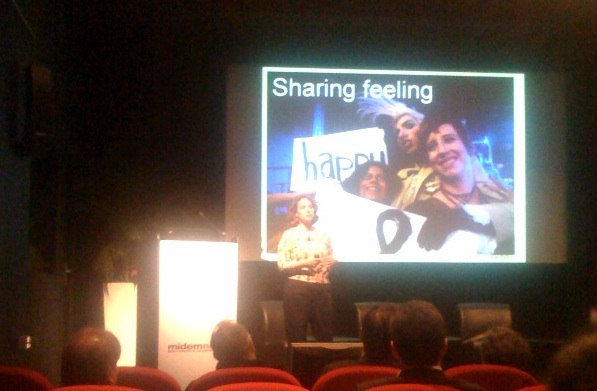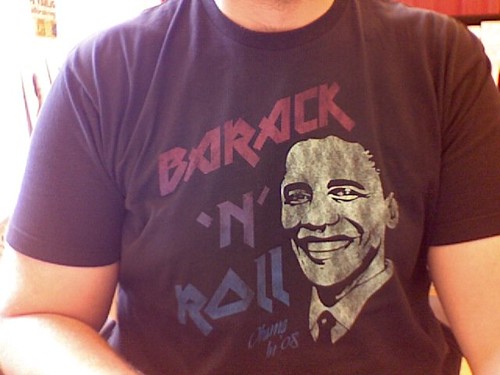 Next week I am headed to France to attend my first MidemNet conference. I’ll be offering a “master class” called “Making the Most of Online Music Fandom” in which I will overview the social activities that motivate fans to engage one another, how the internet transformed those activities in ways that empower fandoms, why this terrifies people used to having all the control in the relationships between musicians and fans, and I’ll suggest some key principles for forming symbiotic relationships with fans.
Next week I am headed to France to attend my first MidemNet conference. I’ll be offering a “master class” called “Making the Most of Online Music Fandom” in which I will overview the social activities that motivate fans to engage one another, how the internet transformed those activities in ways that empower fandoms, why this terrifies people used to having all the control in the relationships between musicians and fans, and I’ll suggest some key principles for forming symbiotic relationships with fans.
When I was first asked to do this, it inspired a long line of thought about who I would invite if I were going to put together my dream program to hear people talk about building relationships between musicians and fans.
I’d include people having great success with the patronage model of fan funding for recording costs like someone from Marillion or Jill Sobule.
I’d want some people from labels who have been genius about opening new avenues for artists and fans to interact, people like Terry McBride or Martin Thörnkvist.
I’d want people from companies like ReverbNation who are always one step ahead in figuring out how musicians can marshall fans’ enthusiasm in ways that benefit them both.
I’d want a good analyst from the outside, like Mike Masnick from Techdirt.
And then, you’d need some people who lead successful fan sites, like MadonnaTribe.
Get some managers who’ve been really good at communicating with fan boards, like Robbie Williams’s manager.
Add in some executives from the important companies.
And then, for good measure, include at least one artist who’s now representing many artists trying to make sense of the digital music industry, someone like Feargal Sharkey who, in his late 1970s incarnation as singer of The Undertones drastically improved the quality of my life for decades even if I’m not sure I like what he’s up to now.
So imagine my glee to read the final program and see every single one of these people on it, plus many other excellent choices, and this list doesn’t even include the keynoters (the full program is here in PDF form):
Norman Abdul Halim, President & Group CEO, KRU Studios (Malaysia)
Amul Batra, manager of James Yuill and Managing Director, Fwinki Music (UK)
Nancy Baym, Social Media Researcher, Online Fandom Blog (USA)
Tim Bierman, Manager, Pearl Jam Ten Club (USA)
Michael Bornhaeusser, Managing Partner, 5 Continents Consulting Group (Switzerland)
Bryan Calhoun, VP of New Media & External Affairs, Soundexchange (USA)
Neil Cartwright, Managing Director, Million (UK)
Tim Clark, Manager of Robbie Williams & Managing Director, ie:music (UK)
David Cushman, Director of Social Media, Brando Digital (UK)
Michael Doernberg, CEO, ReverbNation (USA)
Ben Drury, CEO, 7digital (UK)
Mark Earls, HERDmeister, HERDconsulting (UK)
Marcel Engh, Managing Director, SBX / VP Brand Entertainment, Sony Music Europe (UK)
Daniel Graf, Founder & CEO, Kyte (USA)
Allen Guo, Founder & CEO, Yobo.com (China)
Denzyl Feigelson, Consultant, advisor to brands such as iTunes & Coca-Cola and Founder & CEO, awal.com (UK)
Duncan Freeman, Founder & President, Band Metrics (USA)
Betty Yip Ho, CFO, Executive Director, A8 Digital Music (China)
Peter Jenner, Emeritus President, IMMF (UK)
Mark Kelly, Keyboard Player, Marillion (UK)
Eric Korman, President, Ticketmaster (USA)
Nicholas Lansman, Secretary General, UK ISPA (UK)
Gerd Leonhard, Media Futurist & Author, Mediafuturist.com (Switzerland)
Andrew Martyn, Founder & CEO, Mubito (Sweden)
Michael Masnick, Editor of Techdirt Blog and President & CEO, Floor64 (USA)
Rob McDermott, Manager of Linkin Park & President of Music Division, The Collective (USA)
Kenth Muldin, CEO, STIM (Sweden)
Cory Ondrejka, SVP, Digital Strategy, EMI Music (USA)
Pharrell, Editor, Fluokids Blog (France)
Paolo Olivi, Co-founder & Webmaster, MadonnaTribe (Italy)
Shailendra Pandey, Senior Research Analyst, Informa Telecoms & Media (UK)
Juan Paz, Head of Research, Music Ally (UK)
John Possman, President and Co-Founder, Two Four Seven (Japan)
Ian Rogers, CEO, Topspin (USA)
David Schulhof, co-Founder and co-CEO, EverGreen Copyrights (USA)
Feargal Sharkey, CEO, UK Music (UK)
David Smith, CEO, Global Futures and Foresight (UK)
Jill Sobule, Singer & Songwriter (USA)
Geoff Taylor, Chief Executive, BPI (UK)
Martin Thörnkvist, Managing Director, Songs I wish I had written / The Swedish Model (Sweden)
Tim Walker, Co-founder & Managing Director, The Leading Question (UK)
And how much do I love that angry rants in response to one of last year’s MidemNet keynotes serve to get me invited rather than ostracized!
If you’re planning on being at Midem or MidemNet this year and ever peek at this blog, I’d love to meet you. Shoot me an email so we can connect.
If you’re not able to be there, the MidemNet blog may be your next best bet.








 Next week I am headed to France to attend my first
Next week I am headed to France to attend my first